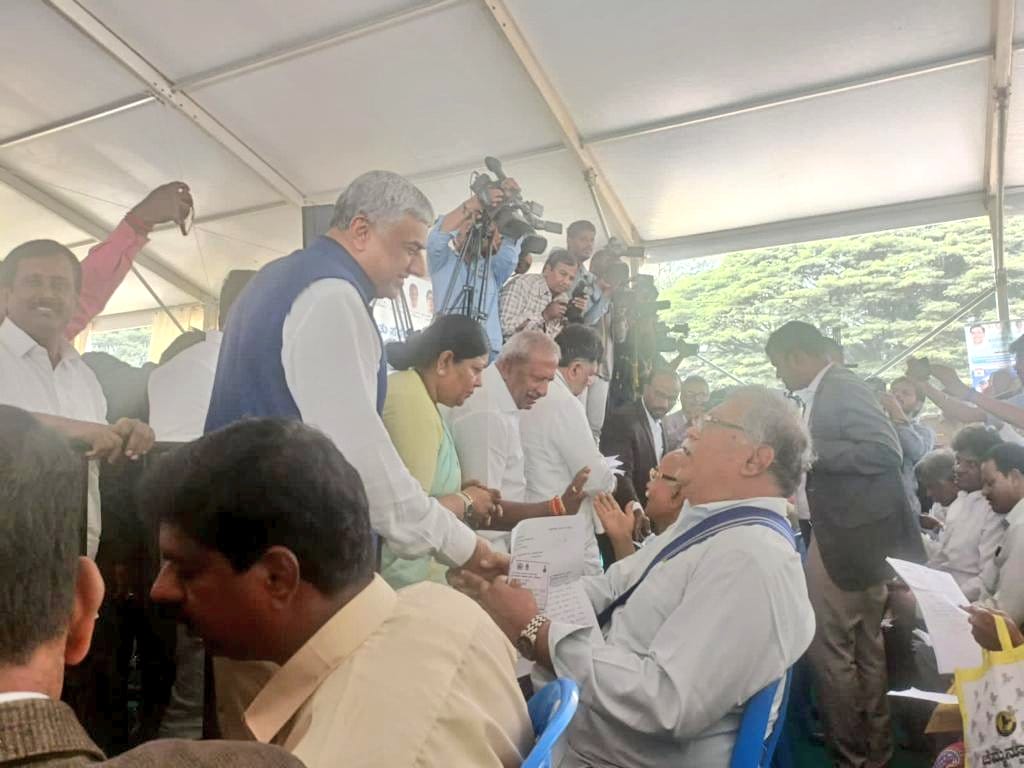KSRTC to induct 2,000 buses
The Karnataka State Road Transport Corporation (KSRTC) plans to add 2,000 buses, of which 500 will be e-buses. It will also introduce Vehicle Tracking & Monitoring System (VTMS), a mobile app, and cashless travel. There will be 1,000 refurbished buses too.
As the Shakti scheme had increased the demand for KSRTC buses, especially in rural areas, it is expected that 1,000 Karnataka Sarige buses will improve rural connectivity.
Meanwhile, passengers will soon be able to pay through smart electronic ticketing machines (ETMs).
Source: The Hindu, Bangalore Mirror
Read more: Looking back at 2023: A review of public transport developments in Bengaluru
New Year security steps
To ensure security during New Year revelry, Commissioner B Dayananda directed all police personnel to wear body cameras on their shoulder belts. Commissioner Dayananda was at the command center, overseeing the 2.5 lakh CCTV camera feeds across the city, monitoring public gatherings and ensuring crowd safety. One cop said that they finished work by 4 am after the crowds were cleared.
Upto midnight, there were reports of one fatal accident and ten non-fatal accidents. From midnight to 7 am on January 1st, three fatal accidents were reported.
The police checked over 7,620 vehicles, resulting in 330 drunk driving cases. Upto midnight, there were reports of one fatal accident and ten non-fatal accidents.
Breaking tradition, the Commissioner asked his team not to pay courtesy visits to him, but to stop at NGOs, handicap rehabilitation centres and old age homes.
With 6.26 lakh passengers, there was a surge in Metro’s ridership between 11 pm on December 31, 2023, and 11 pm on January 1, 2024. The Bengaluru Metro Rail Corporation Limited (BMCRL) had made tickets available at a reduced rate of Rs. 50, with the operating hours extended to 2 am from the existing 11 pm.
A video showing the packed trains created confusion. The video shared by @ChristinMP_ on X, showed some critics of the crowd control and highlighted social distancing norms to prevent infections.
Source: India Today, Bangalore Mirror, Indian Express
Crime rate shot up in 2023
The crime data, released by City Crime Record Bureau (CCRB), charted a general rise in crime cases, although the rate of detection rate fell to 29% in 2023 from 45% in 2022. Srinivas Gowda, Deputy Commissioner of Police (Crime-2), said that filing of FIRs have increased, as even the pettiest crimes are getting converted into FIRs. Even the cases are reported.
Cybercrimes nearly doubled. In 2023, the police took up 17,623 cybercrime cases, against 9,940 in 2022 and 6,422 in 2021. However, detected/solved cases remained lower in 2023 at 1,271. The figure was 2,431 in 2022 and 2,257 in 2021. Hence, most crimes are occurring online and evolve fast with fraudsters who find new ways of cheating.
There were fewer cases under Narcotic Drugs and Psychotropic Substances Act in 2023 than the previous two years, mainly due to policy change. NDPS Act is invoked when large quantities of illicit drugs are seized.
There were 3,260 cases of crimes against women in 2023, a 23.9% increase compared to 2022, and 61% increase compared to 2021. Molestation and dowry cases were major contributors, with 1,135 and 1,007 cases, respectively. The police could crack close to 95.7% of these cases, with 100% detection in rape cases. Activists said the city’s rapid growth and increased aggression were the main causes.
Senior police officials said that registration and reporting have improved by converting alerts from the cyber tip line, the National Cyber Crime Reporting portal (NCRP), and complaints received at 112 into FIRs. An awareness campaign — Cyber Tip a Day — on the police’s social media accounts also helped.
Source: Deccan Herald, The Hindu
Read more: Safe Yelli: A citizen initiative to map unsafe locations in Bengaluru
4,000 public grievances at KR Puram meet
More than 4,000 people swarmed in KR Puram’s ITI Grounds to attend the public grievance redressal programme, called ‘Government at your doorstep’ meet at the KR Puram and Mahadevapura assembly constituencies. BBMP, BDA, Bescom and BMRCL officials were present to address grievances, including lack of infrastructure, issues over guarantee schemes, and corruption.
Deputy Chief Minister and Bengaluru Development Minister DK Shivakumar said the government will appoint an officer to address the grievances. He said that the nodal officer will send applications to the relevant departments, follow up with the officials and communicate the results to the people.
Seniors, disabled persons, women, RWA office-bearers, social and civic activists and grassroot leaders came to vent their concerns. They said that municipal elections should be prioritised, so that they could approach corporators directly.
Source: Deccan Herald, The Times of India
‘AnswerMadiModi’ on tax share: CM
Chief Minister Siddaramaiah tweeted that the state’s tax share is decreasing every year, while most of the tax money paid by Kannadigas is shared by the states of North India. He posted an image showing that the state’s tax share has reached 3.64% in the 15th finance commission, from 4.71% in the 14th Finance Commission. It led to a loss of Rs 26,140 crore to the state in three years.
“Prime Minister @narendramodihimself, why this injustice only for Karnataka? This is the question of six and a half crore Kannadigas. #AnswerMadiModi,” he tweeted.
Meanwhile, the Bharatiya Janata Party (BJP) leader CN Ashwath Narayan retorted that the tax devolution from the Centre during 2014-2024 has been Rs 2,82,791 crore, an increase of 245.7% compared to the Congress-led UPA government.
Source: Indian Express, Hindustan Times
(Compiled by Revathi Sivakumar)
